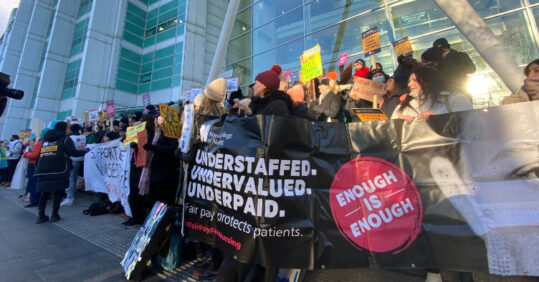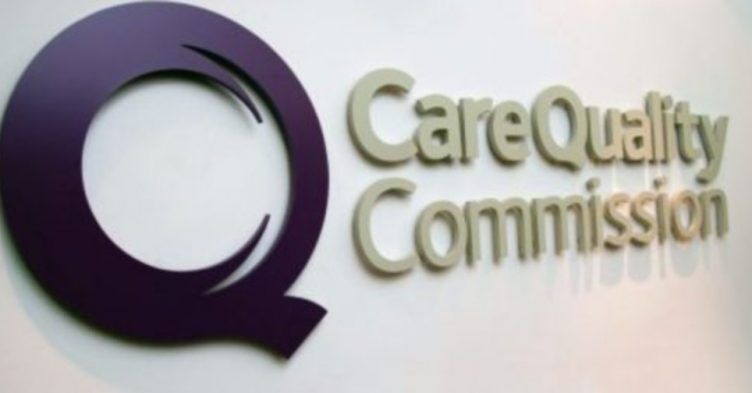As NHS nurses continue to cast their votes in union ballots related to the government’s new pay offer in England, the Royal College of Nursing (RCN) and Department of Health and Social Care (DHSC) have issued exclusive comments to Nursing in Practice on the situation.
‘Ultimately it is in the hands of our members’
Executive director for pay at the RCN, Colin Poolman, says:
‘Until that point ministers were steadfastly sticking to their position that they would not speak about pay for 2022/23. They insisted that the recommendations of the Pay Review Body for the last financial year were final and any further pay rise for nursing was unaffordable.
‘On 2 February we handed a petition in to Downing Street demonstrating the strength of public support, and later that month our members took further strike action. Their determination was overwhelming.
‘It took strike action and the support of the public to get ministers to eventually agree to meet with us.
‘After being told there was no money, we entered the negotiations determined to get the very best for our members and for nursing. There were weeks of offers and counter offers alongside other unions representing NHS staff.
‘Alongside the pay offer we also have a commitment to a national evidence-based policy framework on safe staffing, focusing on registered nurses, that will draw on legislation in the rest of the UK and internationally, and the government has said it will undertake work to reduce violence against NHS staff. This is something we have been campaigning on for some time and has regularly been met with resistance.
‘Securing a pay rise for our members that recognises their incredible skill and professionalism has always been at the heart of our actions, and safe staffing is also core to protecting patients. We will hold ministers to their word.
‘I know the strikes were not just about money’
Parliament undersecretary of state at the DHSC, Maria Caulfield, says:
‘Nurses are the backbone of the NHS. They went above and beyond the call of duty during the pandemic to care for our loved ones.
‘In recent months we have seen unprecedented strike action at a time when the NHS is focussed on tackling the Covid backlogs.
‘That’s why I was pleased when the government and unions representing the Agenda for Change workforce, including the RCN, entered constructive talks and agreed a fair pay offer to help end disruptive strikes.
‘The offer recognises the hard work of NHS workers to help recover healthcare services since the pandemic. It includes a ‘NHS Backlog Bonus’ of at least £1,250, as well as a one-off award worth 2% of an individual’s salary for 202/23. This is on top of the at least £1,400 pay rise nurses already received in 2022/23.
‘The offer also includes a pay increase of 5% for 2023/24 – the new financial year which begins on 6 April.
‘If accepted, it would mean a newly qualified nurse would see their salary go up by more than £2,750 over two years from 2021/22 to 2023/24 – and they would receive more than £1,890 in one-off payments for the 2022/23 financial year. If members choose not vote for this deal, the default is the pay review body process for setting pay for the 2023/24 financial year, which would mean there would be no lump sum payment for this year.
‘The RCN has recommended its members accept this offer – as have other health unions representing paramedics, ambulance workers, physiotherapists and others. It balances giving nurses a fair pay rise with the wider economic challenges facing the UK and the Prime Minister’s mission to halve inflation which is having the biggest impact on the money in people’s pockets.
‘But as a nurse myself, and from speaking to staff, I know the strikes were not just about money. Staffing shortages, professional development and workload are all reasons why nurses can feel undervalued.
‘The government recognises this and has committed to working further with the NHS Staff Council, RCN and healthcare leaders to address these issues and make the NHS a better place to work for all.
‘We will soon publish a long-term workforce plan to grow the number of nurses and improve retention. We’re making progress with more than 38,000 nurses working in NHS trusts and general practice compared to September 2019 – but I know there’s a long way to go.
‘The government is backing health and care services with record funding to help improve patient care and cut waiting lists, including up to £14.1 billion for the next two years.
‘I urge union members to vote to accept this pay offer so we can put this dispute behind us and focus on working together to build a brighter future for nursing, patients and the NHS as a whole.’
Voting for the RCN ballot closes on 14 April.






